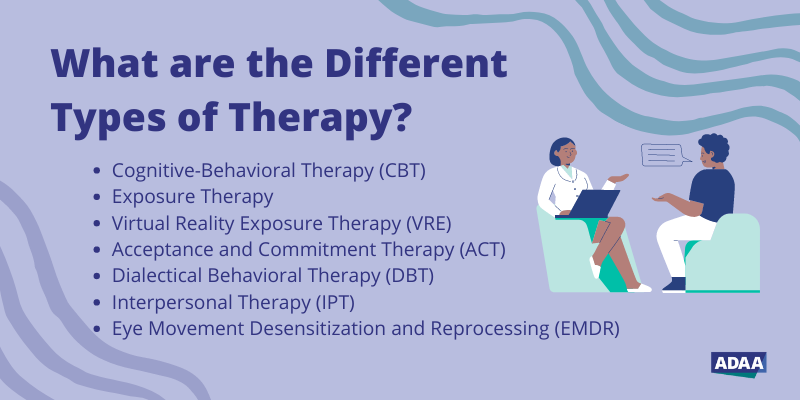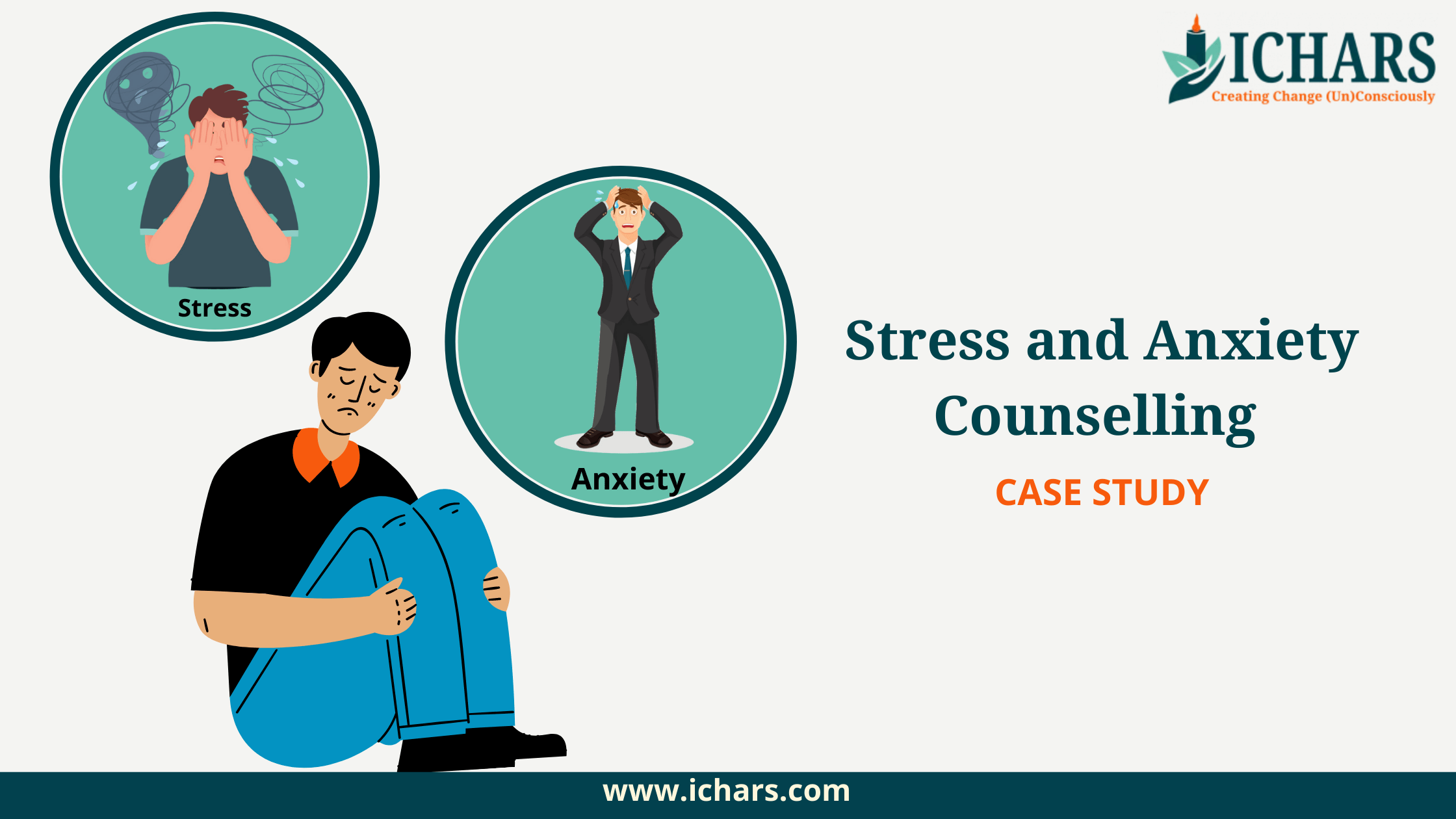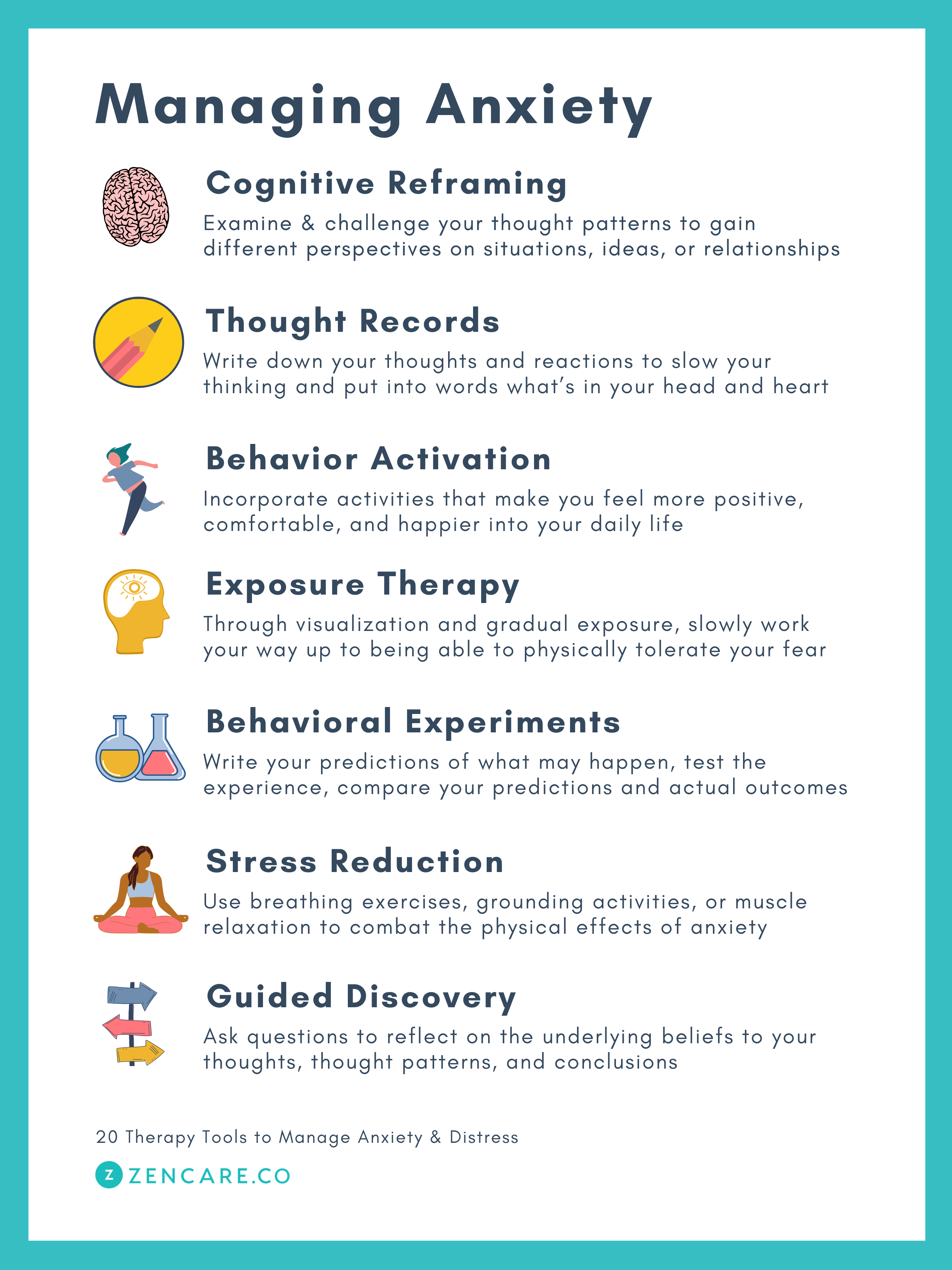Start your journey with counselling for anxiety disorder supported by professionals
Start your journey with counselling for anxiety disorder supported by professionals
Blog Article
Exploring Various Approaches in Coaching for Anxiety Condition for Long-term Modification
When tackling stress and anxiety conditions, it's important to explore a range of therapy approaches. Each technique supplies unique understandings and devices to aid you manage your symptoms properly. You could find that integrating methods can produce the very best outcomes. Comprehending the subtleties of these methods is vital to promoting lasting change. What if the right combination could release a new degree of emotional wellness for you?
Comprehending Anxiety Disorders: A Short Introduction
Anxiety disorders, which affect millions of individuals worldwide, can substantially impact day-to-day life. You could experience frustrating feelings of fear or worry that appear irrepressible. These sensations can result in physical signs like a racing heart, sweating, or perhaps wooziness. Typical sorts of anxiousness conditions include generalised stress and anxiety condition, panic condition, and social anxiety problem. Each has distinct indications, however they all share a tendency to interrupt your routine and relationships.Understanding the origin triggers of your anxiety is essential. It may originate from genes, brain chemistry, or life experiences. Recognizing your triggers can assist you manage your actions much better. It is very important to keep in mind that you're not the only one in this struggle. Lots of people deal with comparable difficulties, and seeking aid is a solid action toward sensation better. By finding out about stress and anxiety disorders, you're currently on the path to understanding and managing your condition better.
Cognitive-Behavioral Treatment: Testing Negative Thought Patterns

Recognizing Adverse Thought Triggers
When you run into moments of distress, recognizing the particular triggers behind your unfavorable thoughts can be essential in managing stress and anxiety. Start by paying attention to situations that provoke sensations of fear or anxiety. Is it a jampacked area, an upcoming target date, or a discussion with specific people? Write these instances in a journal. This will help you identify patterns in your reasoning. Notification physical feelings that accompany your unfavorable thoughts, like an auto racing heart or tightness in your breast. By pinpointing these triggers, you obtain understanding into what's sustaining your anxiety. Comprehending these connections is the primary step in challenging those ideas and eventually restoring control over your emotional feedbacks.

Changing Ideas With Positives
Challenging negative thought patterns is an essential step in changing your state of mind and minimizing anxiety. You may often discover on your own caught in cycles of self-doubt or devastating thinking. Rather than allowing these ideas determine your feelings, practice replacing them with realistic choices or positive affirmations. When you believe, "I can not handle this," move it to, "I can handle difficulties one step at a time." This basic modification can substantially impact your emotion. Routinely determining and countering these negative ideas aids produce a healthier interior dialogue. Keep in mind, it takes time and initiative, yet constantly exercising this technique can result in long-term change, empowering you to face anxiousness with restored confidence and resilience
Structure Coping Methods Together
Changing negative ideas is just the beginning of managing anxiousness successfully. To develop long-term adjustment, you need to construct coping techniques that equip you. Cognitive-Behavioral Treatment (CBT) helps you identify and challenge those purposeless idea patterns. Together, you and your counselor can discover exactly how these ideas impact your sensations and behaviors.Start by establishing useful strategies, like journaling or mindfulness exercises, that allow you to challenge anxiousness head-on. When you face your anxieties slowly, you'll find out to react differently.

Mindfulness and Acceptance-Based Approaches: Growing Present-Moment Understanding
As you browse the intricacies of anxiousness, integrating mindfulness and acceptance-based approaches can significantly enhance your ability to grow present-moment awareness. By concentrating on the here and now, you'll discover that you can observe your ideas and feelings without judgment. This method aids you recognize your anxiety without really feeling overwhelmed by it.Engaging in mindfulness workouts, such as deep breathing, body scans, or led meditations, allows you to ground yourself in your present experience. Acceptance-based strategies encourage you to welcome your emotions instead of battle versus them. They lose their power over you.Incorporating these techniques into your daily routine can transform exactly how you respond to stress and anxiety when you approve your feelings. You'll establish resilience and discover to browse demanding scenarios with higher convenience. Eventually, cultivating present-moment awareness lays the foundation for long lasting adjustment, equipping you to lead a much more fulfilling life.
Exposure Treatment: Challenging Concerns Slowly
Exposure treatment helps you confront your fears in a gradual means, making it less overwhelming. You'll discover techniques to face anxiety-provoking scenarios detailed, while also building coping strategies to handle your reactions. This technique encourages you to take control and lower stress and anxiety gradually.
Steady Direct Exposure Techniques
When facing stress and anxiety, gradually challenging your fears can be an effective method to restore control. This technique, called steady direct exposure, involves slowly subjecting on your own to the circumstances or things that trigger your anxiousness. Start with much less intimidating scenarios and progressively work your means up to even more challenging ones. As an example, if you hesitate of public talking, you might start by speaking before a mirror, after that progress to sharing thoughts with a pal, and eventually attend to a little team. Each step assists desensitize you to the anxiety, developing your self-confidence in time. Remember, it's important to rate yourself and celebrate little triumphes as you move with this procedure, reinforcing your capability to take care of anxiousness successfully.
Structure Coping Techniques
Structure effective coping approaches is important for handling stress and anxiety, specifically as you confront your anxieties gradually. One powerful method is exposure therapy, where you start by encountering your worries in a controlled manner. Begin with less intimidating scenarios and slowly work your method as much as more tough scenarios. This gradual exposure helps desensitize you to stress and anxiety activates, making them less overwhelming.Incorporate relaxation techniques, such as deep breathing or mindfulness, to calm your mind during direct exposure. Track your progression, commemorating little success along the road to boost your self-confidence. Bear in mind, it's all right to take your time; the goal isn't excellence yet constant renovation. By building these strategies, you'll empower yourself to navigate stress and anxiety and accept life much more completely.
Psychodynamic Treatment: Discovering Origin of Anxiousness
Psychodynamic treatment discovers the subconscious mind, revealing the origin of your anxiousness - Counseling services for anxiety. By analyzing your thoughts, sensations, and past experiences, this technique aids you discover underlying conflicts and unsolved problems that might contribute to your present stress and anxiety. You'll function with a therapist to explore youth experiences, relationships, and emotional patterns that form your reactions today.As you obtain insight right into these deeper layers of your psyche, you'll begin to identify just how past occasions influence your existing behavior. This understanding can cause catharsis, permitting you to refine feelings you might have suppressed.Through the restorative relationship, you can also identify defense devices that might have developed gradually, using a more clear path to transform. Ultimately, psychodynamic therapy furnishes you with the devices to resolve your anxiety at its core, advertising long-term change in your psychological health
Integrative and Alternative Techniques: Incorporating Strategies for Greater Efficacy
Integrating numerous restorative methods can boost your trip towards managing stress and anxiety better. By integrating elements from cognitive-behavioral treatment, mindfulness methods, and click here all natural strategies, you can create a tailored technique that addresses your unique demands. You may make use of cognitive-behavioral strategies to challenge negative idea patterns while including mindfulness exercises to ground on your own in the existing moment.Additionally, exploring holistic techniques such as yoga exercise or reflection can advertise relaxation and decrease anxiousness signs. This blend permits you to create higher self-awareness and resilience.Experimenting with these varied techniques can assist you discover what reverberates most with you. Bear in mind, it's regarding locating a synergy that functions, as opposed to sticking to a single approach. This integrative approach not only offers immediate alleviation yet likewise cultivates long-lasting abilities for handling anxiety, encouraging you to recover control over your life.
The Duty of Support Systems: Building Strength Through Link
While it might seem that taking care of stress and anxiety is a singular journey, having a solid support group can play a crucial duty in your resilience. Bordering yourself with understanding friends, family, or assistance teams develops a secure space where you can freely share your experiences and sensations. You remind on your own that you're not alone in this struggle.These relationships provide support and can give sensible coping strategies that have worked for others when you link with others. It's likewise a possibility to obtain viewpoint; friends can assist you see circumstances in different ways, reducing feelings of isolation.Moreover, psychological support fosters a sense of belonging, which can considerably alleviate stress and anxiety signs and symptoms. By leaning on your support system, you can build resilience and deal with difficulties better. Keep in mind, getting to out for assistance signifies toughness, and it can make all the distinction in your trip towards taking care of anxiety.
Regularly Asked Concerns
What Are the Typical Signs And Symptoms of Stress And Anxiety Conditions?
You could experience uneasyness, tiredness, problem focusing, irritability, muscular tissue tension, and sleep disruptions. Physical signs can consist of fast heart beat, sweating, and trembling. Recognizing these signs early can aid you look for suitable support and therapy.

For How Long Does Therapy Typically Last for Anxiousness Conditions?
Treatment for anxiety problems usually lasts anywhere from a few weeks to a number of months. It actually relies on your private demands, development, and the strategies your therapist makes use of to aid you handle your anxiety successfully.
Can Medication Be Utilized Along With Treatment for Stress and anxiety?
Yes, drug can most definitely be used along with therapy for stress and anxiety. Incorporating both strategies commonly boosts treatment effectiveness, assisting you manage symptoms while exploring underlying problems via counseling. Constantly consult your doctor for customized advice.
Are There Self-Help Techniques for Handling Anxiousness?
Yes, there are numerous self-help strategies for managing anxiousness. You can exercise mindfulness, involve in regular exercise, maintain a balanced diet, develop a regular, and utilize deep breathing techniques to help in reducing anxiousness symptoms effectively.
How Do I Know if I Need Professional Assistance for Anxiety?
You should consider looking for specialist aid for anxiousness if it interferes with day-to-day life, triggers substantial distress, or if self-help strategies aren't functioning. Depend on your reactions; getting to out can cause better coping skills and support. Usual types of stress and anxiety conditions include generalized anxiousness problem, panic disorder, and social stress and anxiety problem. When you run into minutes of distress, acknowledging the details triggers behind your adverse thoughts can be vital in handling stress and anxiety. Changing adverse thoughts is only the beginning of managing anxiety successfully. By examining your ideas, sensations, and past experiences, this approach helps you reveal underlying problems and unsolved issues that may contribute to your existing stress and anxiety. It's also a chance to get point of view; good friends can help you see situations differently, lowering feelings of isolation (Counseling services for anxiety).Moreover, psychological support fosters a feeling of belonging, which can considerably minimize anxiousness signs
Report this page